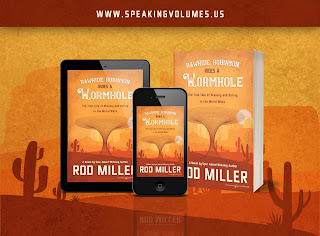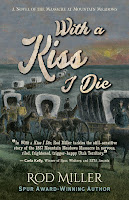My latest novel, All
My Sins Remembered, has been reviewed by readers a number of times,
with generally positive comments for such a gritty, violent story. One review
in particular examines the novel in depth and offers incisive analysis—well beyond
what I, as the author, could offer. The reviewer is Charles E. Rankin, and he
is widely experienced in reading, evaluating, editing, and publishing books
about the American West. Mister Rankin is the retired Associate Director and Editor
in Chief of University of Oklahoma Press; former Director of Publications, Montana
Historical Society Press; and former Editor of Montana: The Magazine of
Western History.
Here's what he has to say about All
My Sins Remembered:
It is not by chance that, in his latest
novel, Rod Miller has taken his title, All My Sins Remembered, from
Shakespeare’s Hamlet. Comparable to the Bard and to Cormac McCarthy,
this book is about madness. It is also about good and evil in contention, and the
road this story travels leads to both. The protagonist—an unnamed roadhouse
operator—extorts, murders, and robs from those who have things he wants or who
anger him or who become innocent victims of his haunted dreams. Yet he also
bestows unprovoked kindness, seemingly without recompense, to those most in
need. Others, he leaves alone. Like Hamlet, he dreams, his dreams bring further
madness, and they lead to his undoing.
The story takes place at a roadhouse, a
western-styled Bates Motel. It sits somewhere in the desert along a dusty road
that leads to California and its dreams of renewal in one direction and to some
far off, nondescript valley settlements in another. A mining camp that
vacillates between lingering death and renaissance is located somewhere not too
far up the road, and an impoverished Paiute band ekes out existence somewhere in
the surrounding hills and canyons.
At the roadhouse is a windmill and a
well. Together, they constitute the story’s fulcrum. The windmill furnishes
life-giving water aplenty but at a cost. The well, made unproductive by the
windmill, is a sepulcher. It smells like death, as well it should. Many bodies
lie at its bottom. For the life-giving water from the windmill, the roadhouse
operator charges exorbitantly. All travelers protest the unconscionable cost,
but almost all pay it. They are often invited in for a meal, cooked by a Paiute
woman who lives slave-like at the roadhouse. If travelers come in to eat, they
are directed first to a bowl with water and a towel, but no soap. Soap is for
sale, but only one traveler—the photographer—buys it. He will trade images for
its cost. Otherwise, the travelers’ hands, like their sins, remain unwashed.
The protagonist controls both the
windmill and the well. He is an evil, violent man who commits eleven murders on
stage and is undoubtedly guilty of others. The Indian woman who lives with him
is silent. He likely cut out her tongue, but we never find out for sure. She is
not without heart, however. She is kind to those who deserve it, especially
women.
Despite remoteness, many wayfarers arrive
at the roadhouse. The cast is as diverse as those in Bret Harte’s Outcasts
of Poker Flat. But only two besides the protagonist are particularly
important: the Paiute woman and a mail carrier who travels the road every few
days on his way from valley towns to mining camp and back again. Both are
symbolic. The Paiute woman, like so many Indian people in American history, has
no voice. But she perseveres. Often abused and beaten terribly, she is a
survivor. The man who carries the mail is a Shane-like character. He functions as
fate, conscience, justice, the means to resolution. Like Shane, however, he cannot
remain and must ride off into the sunset at the end.
The story is told in the first person
from the viewpoint of the roadhouse operator so, like it or not, we come to identify
with him. At times, he is a sympathetic character. He does not murder everyone who
comes to his roadhouse. In fact, he gives kindly aid to two Mormon missionaries
who make him think on religion, to three destitute children who win his father-like
sympathy, and to two families so honest, yet so pathetically down on their luck,
they gain his help. Other vignettes are equally curious: the three ladies of
the night who barter their pleasures for his exorbitant charges; the
photographer who does similarly but trades knowledge and photographs of the roadhouse
grounds, including the windmill and the well, for what he owes; and the
freighter who brings him much desired vegetables and foodstuffs.
The story almost seems Manichean, but
it is too complex for that easy interpretation. Rather, as with Shakespeare’s
Hamlet, dreams haunt the protagonist’s sleep. Interludes of flashbacks indicate
a violent past not of his doing. So, we are not without sympathy, but we are
morbidly intrigued. Like a disaster unfolding in real time, we cannot look
away.
It is a cliché, but this is the kind of
book you cannot put down. It is lean; Rod Miller does not waste words. Yet the
story abounds with detail—about food and cooking, about how liquor coats a
glass, about how people look—and don’t look—at each other, about how wagons are
pieced together and taken apart, about how horses and mules are constituted and
act, about telling silences amid edgy conversations. Told with such verve and
knowing detail, the story brings characters without names and distinct faces
clearly to life. The action is swift, the western scene spare and tense, the
whole, as Loren Estleman says, remarkable in its historical accuracy and stunning in its immediacy.

























